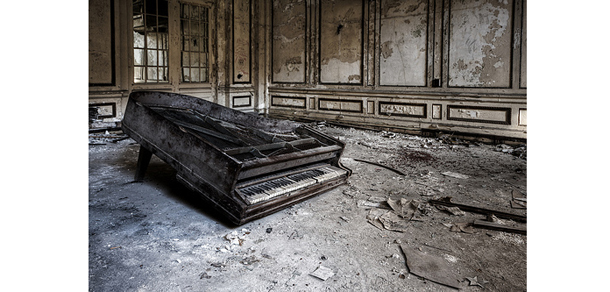This photo wasn’t taken in Chernobyl or in some abandoned Montana ghost town.
It’s in downtown Detroit, a few blocks from shining skyscrapers.

Credit: Rick Harris
Everyone in the US should look at photos like the one above and imagine what this place once was.
The meltdown of the US economy has many looks.
Have you thought about the risks your business and the Flathead economy faces?
Here at home
In the Flathead, the collapse of real estate cascaded into the construction trades and to those who supply the tradesmen with raw materials like lumber.
Those troubles spread to truckers, accountants and others. The interconnections were no longer subtle as the economic virus spread.
Regardless of cause, one market’s problem cascaded through numerous business sectors.
It’s easy to look back now and ask why some construction and real estate folks didn’t create additional revenue streams in businesses that were a bit more state of the economy proof.
It’s also easy to ask the truckers, accountants and others from all walks of life if their customers were too concentrated in one line of work, leaving them too open to a single market’s collapse.
The Hard Question
The question you should be asking yourself is “What did you learn from that and what are you doing to prevent a reoccurrence?”
We talked last week about inexpensive little things that can damage a reputation.
In the comments, some asked if I spoke to the owner or the manager. My visit was not irrelevant to me, but what I did that night is irrelevant in the big picture because of the way most people deal with bad customer experiences.
Most people, taken for granted, will pay their bill, leave without a word, and never return.
Studies have shown that people will tell three others when they have a great experience and ten when they have a poor one.
Even if those numbers are off by a factor of two, how many customers can you afford to take for granted this week?
Guaranteed
There’s an old steel mill town in Pennsylvania called Braddock that’s fighting for its life.
There’s no good reason for that town to be fighting for its life – except that it depended too much on a single business. The steel business.
There’s nothing wrong with the steel business or any other distressed industry until business owners, government officials and employees take the status quo for granted.
“No one” ever thought that the steel business would change.
Prior to Henry Ford, “no one” thought the car business would ever change. Robotics fixed that.
After robotics, surely the car business wouldn’t change AGAIN. But it did.
Programmers felt the same way, multiple times. The end of the (widespread) mainframe era, the dot com boom (and bust) years of the internet, the expansion of open source, the rise of India, and the iPhone. Change.
Then China and other countries started taking jobs from India, and so on.
Change is guaranteed.
What could change in your market and weaken – or destroy – your ability to retain your current market position?
And what are you doing to protect yourself if that happens?
Think back 10, 20 or 30 years…or even as recently as the boom times of 2006.
As GM goes
People once said “As GM goes, so goes the United States.”
Every business owner, every mayor, every county commissioner who takes the current situation for granted – no matter how good or bad – risks making a mistake that creates their own version of Detroit.
Look at these photos of Detroit. Beautiful, yet haunting.
Take nothing for granted.
Not a tax break. Not a contract. Not the supply of electricity, water, lumber, or programmers.
And certainly not a single customer.
Want to learn more about Mark or ask him to write about a business, operations or marketing problem? See Mark’s site or contact him via email at mriffey at flatheadbeacon.com.